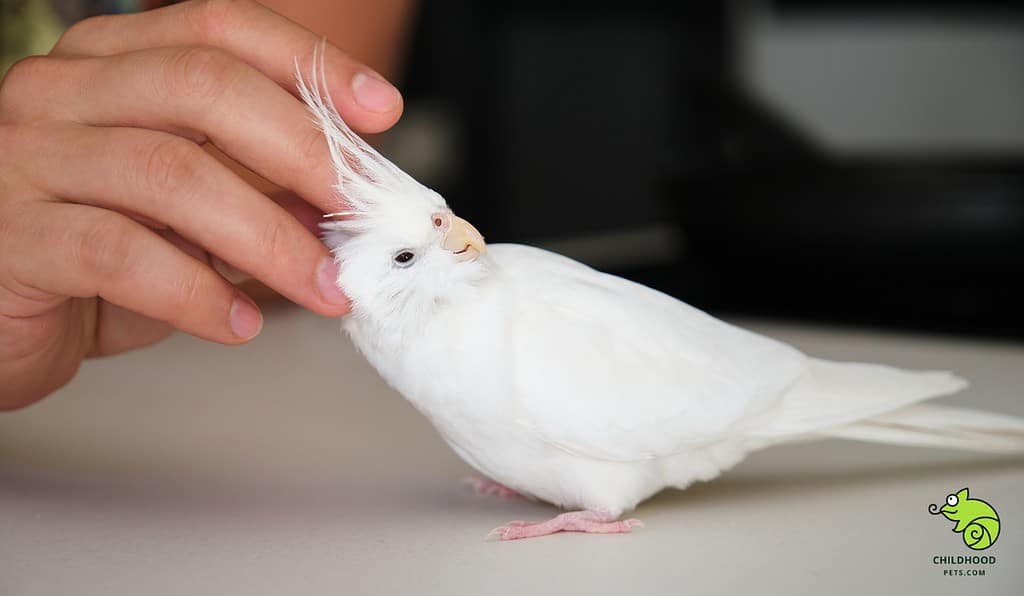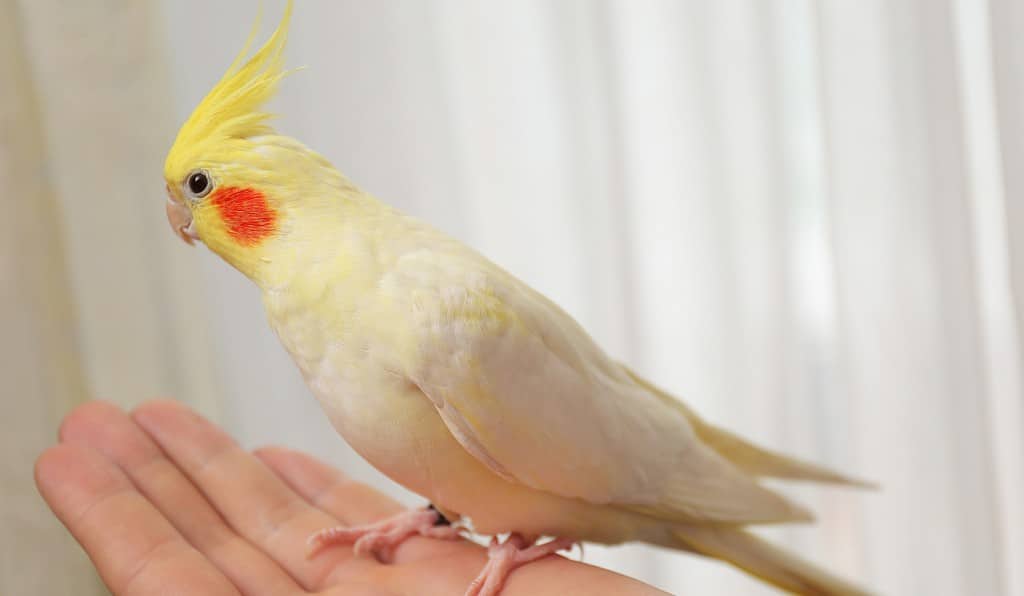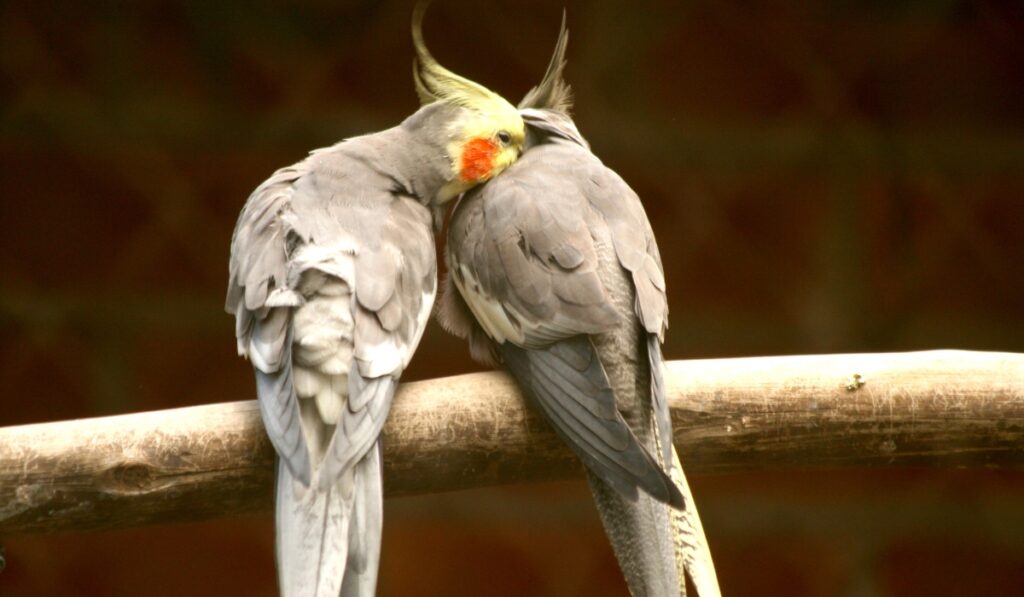
Cockatiels, with their vibrant personalities and captivating behaviors, have long been a favorite among bird enthusiasts. These charming birds, native to the semi-arid regions of Australia, have a unique way of forming deep bonds with their human companions. Their ability to recognize, show affection, and even display signs of empathy makes them stand out in the avian world.
As a general rule, cockatiels can form profound attachments to their human caregivers, often displaying behaviors that signify trust, recognition, and deep affection. These bonds are nurtured through consistent interaction, understanding, and mutual respect, creating a relationship that’s both heartwarming and rewarding.
Let’s Explore the fascinating world of cockatiels and the incredible bond they can form with their human companions. Discover the signs of their affection, ways to nurture this bond, and the sheer joy of having a cockatiel as a lifelong friend. Let’s embark on this feathery journey together!
Why Cockatiels Form Strong Attachments?
Cockatiels form strong bonds due to their social nature and evolutionary history. In the wild, they live in flocks and rely on group cohesion for survival, protection, and locating food sources. This social structure has ingrained in them the need for companionship. When domesticated, cockatiels often transfer this need for social connection to their human caregivers or other pets.
Bonding also provides them with a sense of security and emotional support. Regular interaction, trust-building, and mutual care further strengthen these bonds. Over time, this deep connection can lead to a cockatiel displaying affectionate behaviors, such as singing, preening, and cuddling.
Do Cockatiels Get Attached to One Person?
Yes, cockatiels often form strong bonds with their human caregivers and can become particularly attached to one person. When a cockatiel chooses a favorite person, it may display signs of affection towards them, such as singing, chirping, or wanting to be near them constantly.
Conversely, they might show signs of jealousy or aggression towards others who approach their favored individual. It’s essential for owners to socialize their birds with multiple people to prevent over-attachment and ensure a well-rounded, sociable pet.
Do Cockatiels Recognize Their Owners?
Yes, cockatiels do recognize their owners. These birds are known for their intelligence and strong social bonds. Over time, with consistent interaction, a cockatiel can distinguish its owner from other people based on voice, appearance, and behavior. They often show signs of recognition by chirping, singing, or displaying affectionate behaviors when they see or hear their owner.
How Cockatiels Show Their Love and Affection

As we delve deeper into the world of cockatiels, you’ll discover that these birds have a myriad of ways to express their love and affection. Their behaviors, gestures, and vocalizations are not just random acts but are deeply rooted in their natural instincts and emotions.
1. The Ways Cockatiels Display Affection
Cockatiels, like many other birds, have a unique way of showing their affection and bond with their owners. Over the years, I’ve observed and experienced countless moments of attachment between these charming birds and their human companions. It’s truly heartwarming to witness the depth of their bond.
Common gestures and behaviors that indicate attachment include:
- Regurgitating food: This might sound a bit odd, but when a cockatiel regurgitates food for you, it’s a sign of ultimate trust and affection. In the wild, this is how they feed their young and show love to their mates.
- Singing and chirping: A happy, singing cockatiel is often one that feels safe and loved. They might even mimic your voice or sounds from their environment to communicate with you.
- Nuzzling and snuggling: Just like cats and dogs, cockatiels love to get close and cozy with their favorite humans. They might nuzzle into your neck or snuggle against your cheek.
- Fluffing up their feathers: When a cockatiel fluffs up its feathers around you, it’s a sign of comfort and relaxation.
- Following you around: A cockatiel that sees you as its flock might follow you around the house, wanting to be wherever you are.
2. The Deep Bond with Their Human “Parents”
The bond between a cockatiel and its owner is not just based on feeding and care. It’s a relationship built on trust, regular interactions, and shared experiences. I’ve had moments where my cockatiel would rest on my shoulder, listening intently as I spoke, or would playfully interact with toys I introduced. These shared moments create a lasting bond, one that’s as deep as any human relationship.
3. Love and Monogamy in Cockatiels
Cockatiels are inherently monogamous creatures. In the wild, they form strong bonds with a single mate, staying together for life. This behavior is mirrored even in captivity, where their loyalty and affection can sometimes be directed towards their human caregivers.
Comparison of Mating Behaviors in Cockatiels: Wild vs. Captivity:
| Behavior | In the Wild | In Captivity |
| Finding a Mate | Cockatiels engage in elaborate courtship displays, singing and dancing to woo a potential mate. | In captivity, they might direct these displays towards other birds or even their human caregivers, especially if they’re the only bird. |
| Nesting | They find or create nests in tree hollows, ensuring a safe environment for their eggs. | They might become possessive of certain areas in their cage, treating them as nesting spots. |
| Raising Offspring | Both parents take turns incubating the eggs and feeding the chicks. | This behavior remains consistent in captivity, with both parents being involved. |
| Protecting Territory | Cockatiels can become territorial, especially during the mating season, warding off potential threats. | In a domestic setting, they might show territorial behavior around their cage or favorite spots. |
| Bonding Rituals | Mutual preening and feeding are common bonding rituals. | These rituals are still observed in captivity, and sometimes, they might even try to “preen” their human caregivers. |
Recognizing the signs that suggest a cockatiel perceives its owner as a mate is crucial. They might become more vocal, display courtship behaviors, or even become more possessive. It’s essential to understand these behaviors to ensure the well-being of your feathered friend.
4. Cockatiels Miss Their Human Companions
The bond between you and your cockatiel is so profound that periods of separation can be challenging for them. I’ve seen cockatiels display sheer joy upon being reunited with their owners after a brief absence. Their chirps become louder, their feathers puff up in excitement, and they might even engage in playful behaviors to express their happiness.
There are countless stories of cockatiels who’ve shown immense excitement upon seeing their owners after a long day or even after vacations. Some owners have even captured these heartwarming reunions on video, showcasing the depth of the bond.
5. Sensing Human Emotions: The Empathy of Cockatiels
One of the most astonishing traits of cockatiels is their ability to sense and respond to the emotional states of their human companions. Over the years, I’ve observed these birds adjusting their behavior based on the moods of those around them. It’s as if they have an innate sense of empathy, allowing them to connect with us on a deeper emotional level.
Common signs that a cockatiel is sensing its owner’s emotions include:
- Vocal changes: A cockatiel might chirp softly or sing a comforting tune when they sense you’re feeling down.
- Physical closeness: They might come closer, nuzzle, or even rest on your shoulder, offering their presence as a source of comfort.
- Playful distractions: If they sense you’re stressed or anxious, they might engage in playful behaviors, almost as if trying to distract or cheer you up.
- Quiet observation: Sometimes, they’ll just sit quietly, observing you with those keen eyes, offering silent support.
- Mimicking behaviors: Cockatiels are known to mimic sounds, and sometimes they might mimic certain behaviors or sounds they associate with your mood.
It’s truly heartening to see how these birds adjust their behavior, trying to offer comfort, companionship, or even a momentary distraction from our worries.
6. Cockatiels Identify Their Loved Ones
Cockatiels possess an impressive memory retention capability. They can remember their human companions, other pets, and even specific events or routines for extended periods. When a cockatiel recognizes its owner or a familiar person, the signs are evident. They might puff up their feathers in excitement, chirp loudly, or even start dancing on their perch. Some cockatiels have specific calls or songs they associate with particular individuals, and they’ll sing these tunes upon seeing them.
I’ve had personal experiences where my cockatiel would whistle a specific melody every time I entered the room, a tune we shared during our bonding sessions.
How to Nurture and Maintain the Attachment
As we’ve explored the depth of the bond cockatiels can form with their human companions, it’s essential to understand how to nurture and maintain this attachment.

1. Building trust with your cockatiel
Building trust with your cockatiel is a journey, not a destination. It requires patience, understanding, and consistent effort. Here’s how you can embark on this rewarding journey:
- Start Slowly: Especially with a new or young bird, take things slow. Allow them to get accustomed to their new environment.
- Consistent Interaction: Spend time with your cockatiel daily. Talk to them, sing to them, and let them know you’re there.
- Hand-Feeding: Offering treats from your hand can be a great way to build trust.
- Avoid Sudden Movements: Quick or unexpected movements can startle them. Always approach with calm and composed demeanor.
- Respect Their Boundaries: If they seem agitated or scared, give them space and try again later.
2. Showing Love to Your Cockatiel
Cockatiels are affectionate creatures, and they thrive on love and attention. Reciprocating their affection can strengthen your bond. Physical contact, like gentle petting and allowing them to perch on you, can make them feel loved. Additionally, treats, especially their favorites, can be a great way to show your love.
3. Ensuring Emotional Well-being
A mentally stimulated cockatiel is a happy one. Toys, interaction, and mental challenges are essential.
Top Toys and Activities for Cockatiels:
- Foraging Toys: Encourages natural searching behavior.
- Mirrors: Some cockatiels love to interact with their reflection.
- Swings and Ladders: Great for exercise and fun.
- Bells and Rattles: Engages their auditory senses.
- Puzzle Toys: Challenges their intelligence.
4. Mistakes to Avoid
Building a bond is a delicate process, and certain mistakes can hinder it.
Common Mistakes and How to Avoid Them:
- Yelling or Punishing: This can scare them. Instead, use positive reinforcement.
- Neglect: Consistent interaction is key. Don’t leave them isolated for long periods.
- Improper Diet: Ensure they get a balanced diet.
- Lack of Toys: Mental stimulation is crucial. Keep a variety of toys available.
- Ignoring Health Issues: Regular vet visits and monitoring their health are essential.
Conclusion
The bond between cockatiels and their human companions is genuinely unique and heartwarming. In the fascinating world of avian companionship, cockatiels truly stand out with their unique ways of expressing attachment. Their endearing behaviors, from vocalizing to tail wagging, highlight the deep bond they can form with their human counterparts.
Did you enjoy diving into the world of cockatiels with us? We’d love to hear your thoughts in the comments below. If this article resonated with you, please share it with fellow bird enthusiasts. Let’s celebrate the incredible connection these feathered friends bring into our lives!
Frequently Asked Questions
What do cockatiels love the most?
Cockatiels love interaction and companionship, whether it’s with their human caregivers or fellow birds. They also have a fondness for toys, treats, and music.
How long does it take for a Cockatiel to bond?
The bonding process varies. Some might bond quickly, while others may take weeks or even months. Consistency, patience, and understanding are crucial.
Do Cockatiels get attached to their owners?
Absolutely! Cockatiels can form deep attachments to their human caregivers, often displaying signs of affection and recognition.
How can you tell if a Cockatiel likes you?
Signs include singing when you’re around, wanting to be close to you, nuzzling, and showing excitement when you enter the room.
